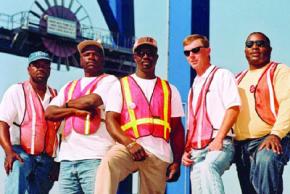Defend the Charleston Five
The Charleston Five were in the fight of their lives in 2001. The five dockworkers, members of the predominately African American International Longshoremen's Association Local 1422, were facing trumped-up felony "riot" charges and house arrest for their part in a peaceful protest that was attacked by police in January 2000.
The campaign to defend the five South Carolina workers captured the imaginations of labor activists around the country, who organized protests, meetings and fundraisers to support them. They organized under the slogan, "If these five men go to jail, your rights go with them." This feature by on the Charleston Five campaign appeared in the June 22, 2001 issue of Socialist Worker.
MORE THAN 7,000 union members marched on the South Carolina capital of Columbia, S.C., on June 9 to oppose the prosecution of five dockworkers on trumped-up riot charges.
AFL-CIO Executive Vice President Linda Chavez-Thompson was among the speakers at this spirited rally for workers' rights and racial justice. When one speaker talked of the international day of action scheduled for the opening day of the workers' trial, the chant when up: "Shut the ports down! Shut the ports down!"
The five dockworkers--members of the International Longshoremen's Association (ILA) Local 1422--are being targeted by Attorney General Charlie Condon, who organized a police crackdown on an ILA picket line on January 20, 2000.
Known as the Charleston Five, they have been under house arrest for more than 17 months. They are confined to their homes between 7 p.m. and 7 a.m., except to go to work or to attend union meetings--and have been forced to miss their children's school functions, a memorial service for a relative and much else.

But a growing defense campaign--endorsed by AFL-CIO President John Sweeney in January 2001--has already raised hundreds of thousands of dollars and spread word of the struggle.
And when Condon attacked union supporters and their "comrades" for organizing the rally, Sweeney and NAACP chair Julian Bond issued a statement denouncing Condon for red-baiting.
At the June 9 rally, speakers from the podium and rank-and-file union members in the crowd denounced Condon's effort to scapegoat an overwhelmingly Black union.
ILA Local 1422 has been central to both union organizing drives and the successful struggle to remove the Confederate flag from over the South Carolina statehouse. Now Condon--backed by the fast-growing manufacturing employers in the state--wants to attack both labor rights and civil rights by jailing one white and four Black workers.
"Today, I'm really proud to see Black and white and Hispanics," Lawrence Lennon, a member of ILA Local 1426 in Wilmington, N.C., told Socialist Worker. "I should say that all of the unions that you see represented here today know how important it is to be together, to stand together.
"The worst thing that happened to us was when Reagan fired the air traffic controllers. We were shut down and weakened then. But we're coming back now."
Unions from across the South turned out--including large delegations from the Communications Workers of America, Service Employees International Union, United Auto Workers (UAW), Teamsters and UNITE, as well as the ILA.
Buses came from as far away as Detroit and New York City. The Atlanta Central Labor Council paid for 20 buses, and the UAW organized busloads from three area plants.
The West Coast-based International Longshore and Warehouse Union (ILWU) brought more than 100 members--and ILWU President James Spinosa repeated his vow to shut the docks from Vancouver to Hawaii on the day that the case goes to trial.
Representatives from dockworkers' unions in Sweden and Denmark pledged to take action as well.
One of the most moving speeches was by Yu Kwang-jun of the Daewoo Auto Workers Union in South Korea.
"Workers in South Korea know about the vicious racism and repression faced by Black workers in South Carolina," said Yu, whose union has itself been the repeated target of police violence in its struggle to defend jobs.
Several top U.S. labor leaders--including United Mineworkers of America President Cecil Roberts and Coalition of Black Trade Unionists leader Bill Lucy--spoke at the rally.
Even conservative ILA President John Bowers--who was reluctant to endorse the campaign--was on hand. Roberts got wild cheers when he vowed to go to jail with the Five, as did retired Southern Christian Leadership Conference leader Rev. Joseph Lowery.
The mood in the crowd--composed overwhelmingly of union members--was defiant.
"I'm here to support the Charleston Five--to fight the anti-labor practices that have been going on," Diane Jordan, a member of the UAW from Georgia, told Socialist Worker.
"I've been a union activist for 22 years. To organize the South is a pretty tough job, but we're going to organize here. These right-to-work states are going to have to accept the fact that unions are here, and we're not going anywhere."
Diane Ballentine, president of the Flint Glass Workers Local 1028 in Raleigh, N.C., agreed.
"In South Carolina, you've got a predominately Black union that's doing very well, and I think this [attack] is to destroy that union," she said. "It doesn't matter what color you are, what race, where you're from, whatever. Everyone benefits when we support our unions."
As ILA President Kenneth Riley put it in his speech at the rally: "One message that I have for Charlie Condon: you saw a small, local union down in Charleston, South Carolina, and you decided that you could attack us.
"But you didn't know that the rest of the world was watching."
"We're ready to take action"
THE CAMPAIGN to defend the Charleston Five is growing. More than 7,000 union members and supporters poured into the South Carolina capital of Columbia on June 8 to send the message that they won't allow union rights and civil rights to be trampled.
Already, the local that represents the Five--ILA Local 1422--has received hundreds of thousands of dollars for its defense fund.
The five dockworkers facing trial on felony riot charges--Kenneth Jefferson, Elijah Ford Jr., Peter Washington Jr., Ricky Simmons and Jason Edgerton--have been under house arrest for more than 17 months.
But the "riot" was a police attack on a peaceful picket line of 150 workers by 600 heavily armed cops in January 2000.
The initial charges against several ILA members were dismissed in local courts. But State Attorney General Charlie Condon--an ambitious politician who wants the Republican nomination for governor--wouldn't give up.
He got a grand jury indictment against the Five in a bid to win the support of multinational corporations that have invested in hundreds of new factories in South Carolina in recent years.
The ILA also played a key role in electing Democratic Gov. Jim Hodges, earning it the hatred of the state's Republican establishment.
And since Local 1422 is overwhelmingly African American, Condon thought he could ride a white backlash into the governor's mansion.
Instead, he's got a fight on his hands.
Thanks to a tireless effort by Local 1422 members, the campaign to defend the Charleston Five has won the backing of not only major unions in the Southeast, but the AFL-CIO, too.
What's more, Local 1422 has already won a union contract with the Denmark-based shipping company, Nordana, whose use of the nonunion stevedoring company WSI provoked the picket-line battle in January 2000.
And 80 percent of workers at WSI have themselves signed union cards in advance of a union election to be held next month.
With the case of the Charleston Five expected to go to court in September, all efforts are on raising funds and preparing for an International Day of Action on the first day of the trial.
The International Longshore and Warehouse Union has already pledged to shut ports on the West Coast--and Swedish, Danish, Spanish and other dockworkers' unions have vowed to take action as well.
The fight is on! Free the Charleston Five!
What's at stake in this fight?
UNION RIGHTS. Racial justice. Organizing the South. Corporate globalization.
All these issues exploded into a police riot on the docks in Charleston, S.C., on the night of January 20, 2000--and remain today at the heart of the struggle of the Charleston Five.
With a unionization rate of less than 4 percent and wages 20 percent below the national average, South Carolina has been a powerful magnet for foreign multinational corporations like BMW, Robert Bosch and Michelin--as well as U.S. giants like DuPont, General Electric and W.R. Grace.
But ILA Local 1422 represents a threat to this corporate-friendly environment.
The union provided crucial assistance to organizing drives across South Carolina in recent years. And as a nearly all-Black union in a state with a 30 percent African American population, the ILA has challenged the race-baiting, divide-and-conquer tactics used by employers to keep unions weak in the South for more than a century.
That is why many key unions in the region--mainly those grouped in the Atlanta Central Labor Council--have put serious resources into the campaign to defend the Charleston Five.
If Condon succeeds in putting the Five behind bars, it would have an immediate impact on organizing efforts and campaigns to improve labor laws. A defeat in Charleston could set back the labor movement in the South for years.
But the case has implications across the U.S.--and around the world. With a union-bashing president in the White House, a defeat for the ILA would only strengthen the Republicans' drive to weaken unions.
And shipping-line bosses--who in recent years have attacked dockworkers' unions in England, Australia, New Zealand and Brazil--would only be encouraged to go on the offensive around the globe.
As one of the Charleston Five campaign's slogans put it, "If these five men go to jail, your rights go with them."
That's why it's so important that every union member--and everyone committed to justice--joins this fight.
Free the Charleston Five!



